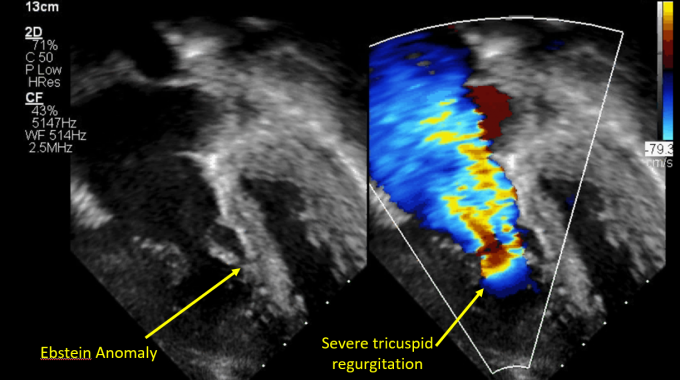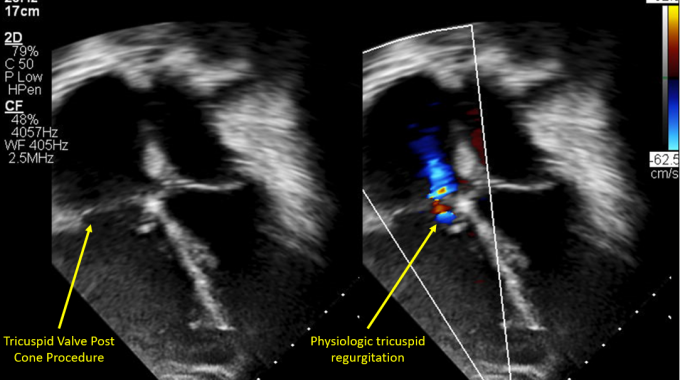As part of the Complex Heart Valve Program at Phoenix Children’s, we perform the Cone Procedure for Ebstein’s Anomaly – which is a rare type of heart defect that is present at birth. The condition ranges in severity from mild to severe, causing a wide range of symptoms, including cough, failure to grow, shortness of breath and excessive fatigue.
What is Ebstein’s Anomaly?
Ebstein’s Anomaly affects the tricuspid valve, which separates the heart’s right lower chamber (right ventricle) from its right upper chamber (right atrium). The tricuspid valve controls blood flow from the heart. In Ebstein’s Anomaly, the tricuspid valve is not in the correct position and it may be misshapen, oversized or stuck to the walls of the heart. If this is left untreated, blood can regurgitate back into the right atrium, leading to an enlarged heart and fluid buildup in the body.

Ebstein's Anomaly, pre-surgery, showing severe tricuspid regurgitation
Additional Abnormalities
Children diagnosed with Ebstein’s Anomaly often experience other cardiac abnormalities including atrial or ventricular septal defects or pulmonary valve stenosis.
Without prompt treatment, life-threatening complications may occur, including:
- Arrythmias
- Cyanosis and oxygenation issues
- Reduced physical activity
- Fluid accumulation
- Heart failure
- Slower growth
What is the Cone Procedure?
The Cone Procedure, also known as Cone Reconstruction, is a surgical technique used to repair the tricuspid valve in nearly any case of Ebstein's anomaly. The surgery uses the patient's own tissue to create a new, cone-shaped valve that closely mimics the normal anatomy of the tricuspid valve. The procedure involves open-heart surgery and extra tissues on the enlarged right side of the heart are folded up, and the malformed valve is surgically reshaped into a cone that opens and closes.
Tricuspid valve replacement is most often used to treat Ebstein’s Anomaly. Although this surgery can alleviate symptoms, long-term outcomes have been poor. Typically, the patient either outgrows the valve or it degenerates, prompting additional medical or surgical treatment.
The Adult Congenital Heart Disease Program at our nationally ranked Center for Heart Care now offers cone reconstruction surgery of the tricuspid valve as an alternative treatment for patients with congenital heart defects.

Repaired tricuspid valve, post-cone procedure
Phoenix Children’s is the first full-range program in Arizona to offer medical, surgical and interventional therapies to manage Ebstein’s Anomaly and proudly stands among only a small number in the entire country. Any patient with Ebstein’s Anomaly can choose cone reconstruction as their treatment of choice over valve replacement. However, the surgery is complex and should only be performed by cardiothoracic surgeons who have specialized training and firsthand experience.
Division Chief of Cardiothoracic Surgery, Joseph and Shawn Lampe Endowed Chair in Cardiothoracic Surgery and Co-Director of Phoenix Children’s Center for Heart Care, Daniel A. Velez, MD, received his formal surgical training from prominent cardiovascular programs around the world, but to master cone reconstruction, Dr. Velez spent valuable time alongside Dr. da Silva at the Children’s Hospital of Pittsburgh so that he could bring this life-saving service back to Phoenix Children’s.
With You for the Journey
It is important to note patients with Ebstein’s Anomaly will require lifelong monitoring and cardiovascular therapy to manage any and all lasting complications. Fortunately for patients who live in Arizona, Phoenix Children’s Center for Heart Care is poised to provide the comprehensive care that is necessary across the lifespan through its Adult Congenital Heart Disease Program. Congenital heart patients will be supported and guided as they transition from pediatric to adult care.
The Center for Heart Care Team at Phoenix Children’s is more than willing to consult with providers in the Southwestern United States to share their experience and expertise. Dr. Velez believes that “by working together, we can help ensure every child has access to the life-changing or lifesaving cardiovascular care they need."
